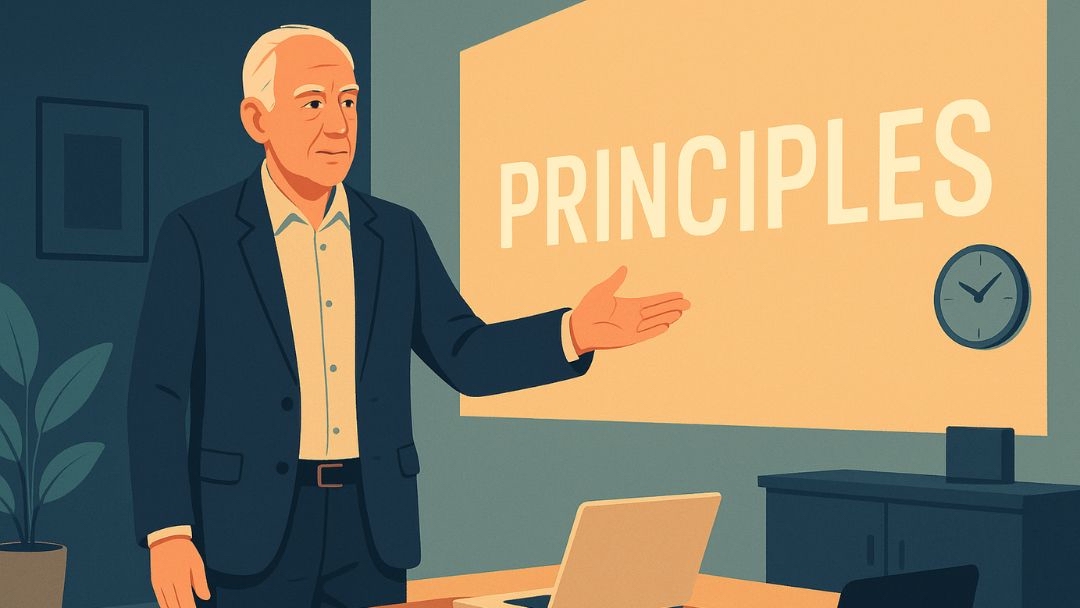How Low Neuroticism Influences Entrepreneurial Style
Scoring low in Neuroticism on the Big Five scale often means staying composed under pressure. This article looks at how that trait supports a focused and consistent entrepreneurial style.


Back
7 mins read
Neuroticism is one of the core traits in the Big Five Personality Theory, often associated with emotional intensity and sensitivity to stress.
Scientific data generally shows that people with poor emotional stability and high neuroticism have lower entrepreneurial intentions and are less likely to become successful entrepreneurs. This is unsurprising, as entrepreneurship is a tricky path associated with stress and unpredictability.
People with a low Big Five neuroticism scale rating demonstrate exceptional emotional stability. Lower scores on neuroticism are characterized by individualism, independence, and autonomy. These characteristics act as motivators to start an entrepreneurial journey. Emotionally stable entrepreneurs remain calm and self-assured even in tense situations, making them ideally suited for entrepreneurship. Their emotional stability is advantageous when tackling the stress and unpredictability that typically accompany launching and running a business. Note that other personality traits, such as high extraversion and high openness to experience, also contribute to business success.
You may also want to read:
- How Does High Neuroticism Impact Entrepreneurial Style?
- How Does Moderate Neuroticism Impact Entrepreneurial Style?
- Best Jobs and Careers for Neuroticism Personality Traits
- Big 5 Neuroticism vs. Emotional Stability: How Do These Traits Impact Learning Styles?
- Neuroticism vs. Emotional Stability and Leadership Style: Strengths and Communication Styles
- Big 5 Neuroticism vs. Emotional Stability Relationship Styles
How Does Emotional Stability Impact Entrepreneurial Style?

Entrepreneurs with low levels of neuroticism stand out for their emotional stability and fortitude. These people remain stable in the whirlwind world of entrepreneurship, where high-pressure situations, market fluxes, and disappointments are regular occurrences.
They're less likely to react emotionally, allowing them to approach difficulties calmly, resulting in logical decisions being made more easily. Plus, they create better work relationships with fewer conflicts, leading to improved workplace cooperation.
The remarkable resilience of emotionally stable entrepreneurs allows them to view any failure as an opportunity for growth. This mindset strengthens their personal brand and builds trust and assurance among colleagues and stakeholders.
Tips for Achieving Success as an Entrepreneur with Low Neuroticism

If you have a low score on the neuroticism scale, you possess qualities that can be incredibly beneficial in business. To get the most out of this advantageous trait, here are some advantages of being an emotionally stable entrepreneur and useful tips to keep in mind:
Leverage Your Emotional Stability:
Your ability to stay cool and collected under pressure is an invaluable asset. Leverage your strength to tackle difficulties that could easily put others off track. You can find a way out even from the most difficult situation and follow rational thinking instead of emotions.
Strong Leadership Qualities:
Team members often turn to their leaders for guidance, particularly in times of difficulty. An emotionally balanced leader can inspire confidence and create a sense of trust and unity among the team, which leads to higher team performance.
Flexibility and Adaptability:
The business world is constantly changing, requiring those with low levels of neuroticism to stay agile and able to modify their approaches without succumbing to the inherent uncertainties. By adapting quickly and remaining composed, emotionally stable entrepreneurs have higher resistance to burnout and stress.
Optimal Resource Allocation:
Emotionally stable entrepreneurs can make sound decisions without letting their emotions get in the way, thereby enabling them to manage resources such as time, money, and workforce more effectively. This ultimately results in maximum return on investment (ROI).
Challenge Yourself:
Emotionally stable entrepreneurs should always seek new challenges. They can be effective across various industries and learn new skills quickly. Try to diversify your business and explore various niches to maximize your revenue.
Having a low level of neuroticism is like having a solid foundation for business success. It's important to recognize and utilize this advantage to make the most out of it. While low neuroticism as a personality trait gives you a significant advantage over people with higher neuroticism levels, you should still work hard to succeed.
Cons of Having Emotional Stability as an Entrepreneur

For entrepreneurs with low neuroticism, emotional stability can be a blessing. But, like all traits, it comes with its challenges. Here's an in-depth look at the major challenges associated with this trait:
Overconfidence:
Having a low score in neuroticism could lead an entrepreneur to overestimate their ability, thinking they can manage any scenario without becoming overwhelmed. While self-assurance is positive, overconfidence might result in consequential mistakes in decision-making.
Misreading Others:
People with low neuroticism may not always understand or be sympathetic to the worries of those around them, such as employees, customers, or partners. This lack of empathy could lead to misunderstandings, declining team spirit, and an inability to recognize market needs.
Reduced Creativity from Emotional Constraints:
The emotional realm, particularly when it comes to neurotic emotions, can be a powerful source of creativity. Emotional instability may encourage us to delve deeper into our thought processes and find unique solutions or creative outputs that wouldn't have been possible otherwise. An emotionally stable state might constrain this kind of inspiration from occurring in the first place.
Potential Blindness to Employee Burnout:
Entrepreneurs with low neuroticism may be unable to identify signs of burnout or emotional stress in their employees. If these warning signals are overlooked and left unchecked, it can result in reduced productivity and increased employee turnover.
Reduced Sense of Urgency:
Remaining calm is beneficial, but sometimes it's essential to make urgent decisions. Entrepreneurs who lack neurotic tendencies might not feel this sense of urgency nor express it well, which could lead them away from potential opportunities and create delays when reacting.
To wrap up, although low neuroticism offers benefits regarding emotional strength and steadiness, entrepreneurs must be aware that it could also have drawbacks. They must keep this in mind, focus on developing emotional intelligence, and listen to more emotional colleagues.
Famous Entrepreneurs with Low Neuroticism

It is widely believed that some of the most successful entrepreneurs have low neuroticism, which may be one factor in their success. Here are some examples of famous entrepreneurs with high emotional stability:
Warren Buffett:
Often praised for his remarkable ability to remain calm and level-headed amidst the turbulence of stock trading, Buffett's emotional stability has been a huge factor in his success. His iconic phrase — "Be fearful when others are greedy and greedy when others are fearful." — illustrates his high emotional stability.
Ray Dalio:
Ray Dalio, the founder of Bridgewater Associates, one of the world's largest hedge funds, is renowned for his principle-based business approach. His approach to decision-making is laid out in his bestseller "Principles," demonstrating his reliance on principles rather than emotions.
Phil Knight:
Phil Knight's remarkable journey from selling shoes out of his car to founding a worldwide sports apparel empire is nothing short of inspiring. His unwavering, emotionally balanced approach and his love for sport and creativity have been fundamental in making Nike so successful.
Larry Ellison:
As co-founder of Oracle, Larry Ellison's savvy leadership has been known for its ambitious strategies and cutting-edge innovation. His effective approach to decision-making has enabled the company to stay ahead in an ever-changing tech world, acquiring numerous other firms and broadening its product range.
Carlos Slim:
Known as the Warren Buffett of Mexico, Carlos Slim has gained remarkable wealth through investments and business decisions in telecommunications and other industries. His success can be attributed to his ability to stay calm even when dealing with Latin America's notoriously volatile markets.
Ted Turner:
The pioneering spirit of Ted Turner, founder of CNN, revolutionized the way we consume news. His emotional resilience was exemplary as he successfully navigated the complex media environment and its associated obstacles.
Julian Robertson:
The former American hedge fund manager and philanthropist Julian Robertson is well-known for founding the Tiger Management Corp. His incredible leadership in the unpredictable financial world and his mentorship of several successful managers demonstrate his emotional stability.
The stories of these business owners traverse borders, cultures, and sectors. Yet, all illustrate the global importance of emotional stability for success. As you can see, successful entrepreneurs in high-risk industries are typically males, which might be partially explained by the fact that men generally have lower neuroticism scores than women. Will this change? Only time will tell.
Low Neuroticism Businesses and Industries

Having emotional stability can be a huge advantage in many business contexts. To further understand where this trait may provide the most benefit, let's take a closer look at several industries and businesses:
Risk Management & Insurance:
The insurance industry is all about anticipating and addressing potential risks. Those who possess emotional stability, remain calm under pressure, and don't let anxiety take over can objectively evaluate risk factors to create well-rounded solutions.
Financial Analysis & Investment:
Navigating the choppy waters of financial markets can be daunting, as fortunes rise and fall in an instant. Those less prone to neuroticism tend to remain calm even amidst such volatility. This ability allows them to make sound decisions focusing on long-term strategies rather than reacting impulsively out of emotion.
Start-Ups in Volatile Markets:
The startup world is anything but predictable. From cryptocurrency to tech innovations and biotech, entrepreneurs are constantly faced with a volatile market that can make navigating the highs and lows of their journey difficult. Emotionally stable entrepreneurs better manage limited startup resources and are more likely to succeed.
Mergers and Acquisitions:
Navigating the complexities and potential pitfalls of mergers, acquisitions, or other business transactions can be a challenging endeavor. Emotionally stable entrepreneurs can make sound decisions in uncertain times without experiencing too much stress.
High-Risk R&D Ventures:
Navigating the challenges associated with R&D in areas such as advanced AI, space exploration, or experimental energy sources can be difficult. However, entrepreneurs with low neuroticism have the capacity to power through any challenges that come their way while keeping their team inspired and laser-focused on achieving business objectives. A high openness to experience score further improves one's ability to innovate and create new technologies.
Private Security Firms:
Offering security services in regions or for clients with greater risk can be extremely challenging and dangerous. However, emotionally stable entrepreneurs can make wise decisions despite high stakes.
Agribusiness Ventures:
Agricultural businesses can be a rollercoaster ride, with varying weather conditions, pest issues, and market fluctuations posing challenges to success. Yet those entrepreneurs who remain calm and emotionally stable in the face of uncertainty are well-positioned for success in this niche.
Some personality and character traits do their best work in the background. Low Neuroticism may not be loud or flashy, but its steady presence can shape the entire course of a business. Sometimes, the real power lies in staying composed when it counts most.


Return to Blog






